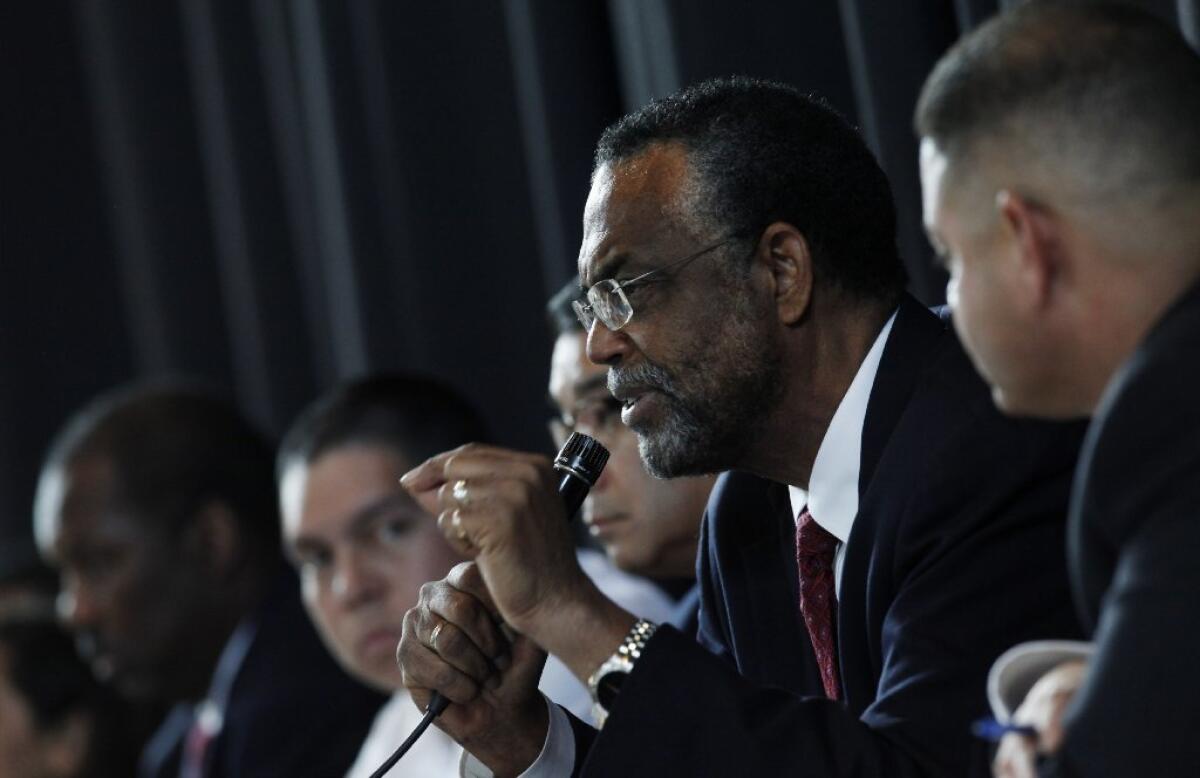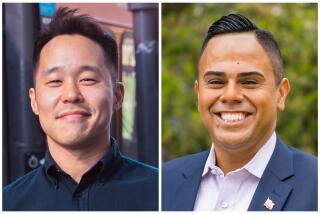Carpetbaggers or specialists? Candidates vie for CD9

This post has been corrected, as indicated below.
If you’re a candidate for Los Angeles City Council and you walk into a roomful of prospective constituents, you’d better be prepared with an answer to this question: How long have you lived here?
That was the first question put to candidates for the 9th District at a forum Saturday at Dr. Maya Angelou Community High School in South Los Angeles. And most candidates were in fact prepared: They had already addressed the issue in their opening statements. And they kept returning to it during the program, and finally there was a more direct, more pointed query: Just when did you move here? The answers, even for those who profess long and strong ties to the community, were often surprising. Three years. A year and a half. Since last summer.
“To our candidates who just moved to District 9, welcome,” teacher Ron Gochez said to his counterparts in his opening remarks. He noted later that he has lived in the district three years.
ENDORSEMENTS: Los Angeles City Elections 2013
The short-timers generally follow up with descriptions of their long ties to the district. They were born here, or work here, or have parents who live here.
The issue has come up in other council races as well, and it’s no wonder. Politically active constituents are wary of candidates they brand as “carpetbaggers” -- candidates they believe just want an office, any office, who then shop around for a district to move into, just before the residence deadline. The democratic ideal, especially in a local race, is to have a candidate who grew up in the district, went to schools there, worked there and has a clear stake in the quality of life there. The assumption is that the homegrown candidate is more likely to understand the needs of the voters, and therefore the residents, and that the imported candidate is more likely to cater to the needs of moneyed interests from somewhere else -- contractors, developers, even labor leaders or human services advocates or anyone else who wants to get something from City Hall not directly and solely related to the quality of life in the district.
But at what point does that analysis become overly provincial and parochial, and that notion of the homegrown candidate become overly romantic? Is a candidate who was born in a hospital that happens to be in the district really more homegrown, and therefore more authentic, than one who moved in during high school? And if someone worked in the district for much of his or her career, but lived just over the line in another district, or even in another part of town, is that really such a big deal?
VIDEO: Interviews with L.A.’s mayoral candidates
There’s an entirely different way of looking at things. If a community needs an expert at economic development, a go-to guy for snagging a larger share of city services, a turnaround artist for fixing up streets -- isn’t it better to call in a specialist? It’s as though you were building a new room onto your house. Do you call the local architect to support the community, or do you get the one from out of town who does the best work?
When the Los Angeles Unified School District needed a superintendent, for example, was it better off when it selected Ruben Zacarias, who served in the district and worked his way up over three decades? Or Roy Romer, who had been the governor of Colorado and was a newcomer to the district, the city and even the state?
Of course, those were appointed officials, not elected ones. On representative bodies, such as the Assembly, there perhaps is something to be said for electing one of your own. After all, how can a representative represent if he or she is not,well, not representative? And so, in the 51st Assembly elections last year, supporters of local guy Luis Lopez contended that rival Jimmy Gomez was moved into the district by the California Nurses Assn., for whom Gomez worked and which poured money into the race to back him. Angry Lopez partisans said unions and other interest groups were stocking the Legislature with imported minions who would do their bidding, leaving it a body that represents not geographic communities but special interests.
JIM NEWTON: The L.A. mayor’s race
In that case, the carpetbagging charges didn’t work. Gomez was elected.
Is the City Council a different matter? Is it a job for a specialist, regardless of residence? Or is it the most fundamentally homegrown office with the most adamant need for a local man or woman?
In the 9th, candidate Curren Price Jr. served on the Inglewood City Council. How homegrown can a candidate be if he’s running for the City Council of one city when he was on the council of another?
If elected to the Los Angeles City Council, though, Price would be joining Councilman Paul Koretz, who formerly served on the West Hollywood City Council. And Paul Krekorian, who was a member of the Burbank school board. All became eligible to run for their Los Angeles city offices only after changing residences and moving into town. But moving “into town” didn’t mean parachuting in from another planet; all of them moved just a few miles, or even a few blocks. Is that carpetbagging? Is it excessive political opportunism?
Or does it bring an enviable degree of expertise? For example, does 13th District long-shot Michael Schaefer have more to offer constituents given his tenure as a councilman in San Diego in the 1970s?
It’s even more trouble when an elected official moves out of the district. Seventh District Councilman Richard Alarcon is accused of living in a house on the wrong side of the district lines and then lying about it. County Supervisor Yvonne Burke was not prosecuted for living in a house miles from her district.
At the 9th District forum, Price insisted that the important question was which candidate has “the background, the training and the expertise” to get the job done, and he noted that he was born in the district. Terry Hara emphasized that he patrolled the area as a police officer. Mike Davis said he had been “involved in the 9th District all my adult life.” David Roberts pointed out that he had worked for people who represented the district. Ana Cubas, who worked for Councilman Jose Huizar in another district, noted that her parents have lived for 20 years in the district where she’s running now. As with Price, she makes the interesting argument that her campaign is a homecoming, to be celebrated.
If it’s really all about who has lived where the longest, the victor in the 9th District would be Manny Aldana, who pointed out countless times at the Saturday forum that he has been in the district 32 years. But it’s hard to see that argument carrying him to victory on March 5.
[For the record: 9:20 a.m. February 19: A previous version of this post said that Sen. Curren Price’s district is centered around Inglewood. In fact, it begins just north of Inglewood and runs as far north as the border of Burbank].
ALSO:
Endorsement: No on Proposition A
Endorsement: Eric Garcetti for mayor
Endorsement: Mike Feuer for city attorney
More to Read
A cure for the common opinion
Get thought-provoking perspectives with our weekly newsletter.
You may occasionally receive promotional content from the Los Angeles Times.











